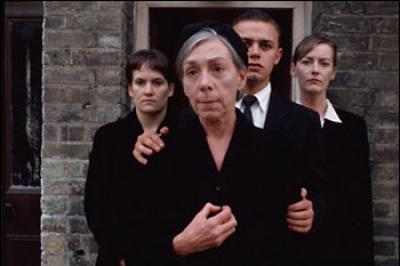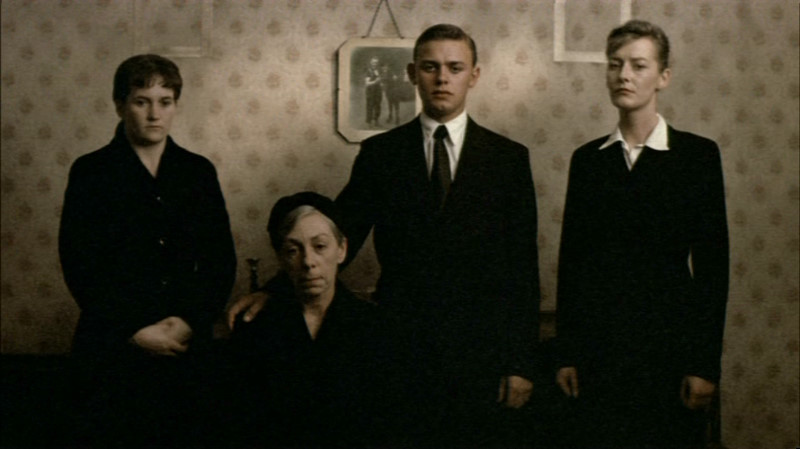You kind of have to feel sorry for the British film industry. Even the most desolate American films are set in places that look glamorous compared to even our greatest terrestrial holiday locations. Still, directors like Terence Davies make this a strength.
In Distant Voices and Still Lives, combined into one film in this remastered re-release, Davies draws on his youth growing up in Liverpool in the 40s and 50s; offering up a grim vision of a harsh time. We witness the ups and downs of a simple working class family as they live through the war and beyond. The only refuge available to them is song.
Paul Farley, the BFI's official 'biographer' for the film, notes that music takes up over half of it. Not in the background, but in lingering sing-a-longs the extended family indulge themselves in down the pub. In fact, all the characters throughout the film seem to be constantly belting out the era's greatest pop hits.
The songs seem to signify the character's dreams. They sing of torrid affairs and bitter vengeance, things they deny themselves of in reality. The songs are their only window into a glamorous, happy life they can only imagine. The women even sing a ditty about a black woman who murders her husband to punctuate their complaints about their marriage.
Tellingly, music only accompanies the singing at the film's beginning and end. Initially to punctuate the absence of characters to sing, and later to show pubescent technology beginning to bring the glamour into the characters homes as they enter the 60s. Likewise, sequences of radio are incorporated into moments when members of the family seem inspired or briefly happy.
Still, this isn't the focus of the piece. The purpose here is an examination of memory. The film doesn't follow the course of a plot, even going beyond the more recent trend for films with complex non-sequential narratives. Scenes aren't just out of order; entire sequences are missed out. Some contradict what we learn in others and some important events are only hinted at in abstract shots with open interpretations.
What unfolds on the screen is less a film's structure and more a document of what the central characters would remember. Hence, many scenes seem inconsequential to the plot, whereas in others events occur with no explanation. Characters burst into tears during what should be the happiest moments of the film, leaving us to only guess at their motives. Happy endings follow on from tragedies that will actually occur after the positive scenes, undermining joyous moments, whilst ensuring tear-jerking consequences never linger. This isn't so much a film as life-on-screen.
The effect illustrates all that is best about anti-Hollywood cinema. Nothing is shown to you in this film. No quarter is given to those who may miss plot points while munching popcorn. Anything you take away comes from the abstract impressions you get.
Never more so than in the case of the film's impetus and the family's patriarch, Tommy, played by the legendary Pete Postlethwaite. His performance and character are the highlight of the film. Distant Voices mainly chronicles his death, but juxtaposes this with his daughter Eileen's later marriage. The marriage seems to be the less pleasant event, with flashbacks illustrating why not all the family had reason to grieve their father. We witness him both beating his daughter with a broom and tenderly saying goodnight to his kids on Christmas Eve. Whether he is misunderstood loving father, or abusive bully, or both, is up to the audience.
If any message is present at all, it is the tyranny that wives and children were under in an age when a man's home was his castle. This is the main illustration of the sequel segment: Still Lives. This picks up where the first part ends, showing how, despite their hopes and dreams, the female characters replace their father with equally-domineering tyrants. They endure behaviour that would see a man arrested, even ten years later, as if they have no choice.
Yet, without Tommy's spectre hanging over their heads, the film flounders. Postlethwaite is a hard act to follow, and the film suffers whenever he is off-screen, but not merely because of his talent. Davies may keep us guessing about events until he reveals them, but he tips his hand too soon. Distant Lives is barely half done before Tommy has played most of his part in the proceedings, and the rest of it and its sequel could almost be extraneous. Being the villain of the piece, the film feels like a super-hero picture where our protagonist defeats his nemesis in the first fifteen minutes.
Still this fits in with the 'real-life' aesthetic and doesn't really ruin anything. The film still holds up as a uniquely British classic and remains historically illustrative. If you haven't seen it, there are far less interesting ways to spend an hour and a half. If you have, I guarantee there's something to get out of a second view.









No comments:
Post a Comment